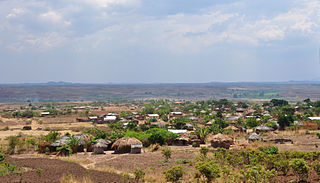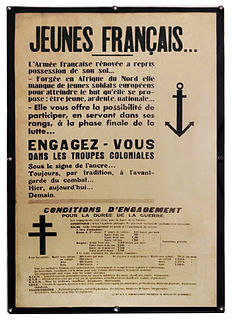
Colonialism is the policy of a country seeking to extend or retain its authority over other people or territories, generally with the aim of economic dominance. In the process of colonisation, colonisers may impose their religion, language, economics, and other cultural practices on indigenous peoples. The foreign administrators rule the territory in pursuit of their interests, seeking to benefit from the colonised region's people and resources.

Imperialism is a policy or ideology of extending the rule or authority of a country over peoples and other countries, for extending political and economic access, power and control, through employing hard power especially military force, but also soft power. While related to the concepts of colonialism and empire, imperialism is a distinct concept that can apply to other forms of expansion and many forms of government.
The French and Indian Wars were a series of conflicts that occurred in North America between 1688 and 1763, some of which indirectly were related to the European dynastic wars. The title French and Indian War in the singular is used in the United States specifically for the warfare of 1754–63, which is mostly coincident with the Seven Years' War. The French and Indian Wars were preceded by the Beaver Wars.

In historical contexts, New Imperialism characterizes a period of colonial expansion by Western European powers, the United States, Russia and Japan during the late 19th and early 20th centuries. The period featured an unprecedented pursuit of overseas territorial acquisitions. At the time, states focused on building their empires with new technological advances and developments, expanding their territory through conquest, and exploiting the resources of the subjugated countries. During the era of New Imperialism, the Western powers individually conquered almost all of Africa and parts of Asia. The new wave of imperialism reflected ongoing rivalries among the great powers, the economic desire for new resources and markets, and a "civilizing mission" ethos. Many of the colonies established during this era gained independence during the era of decolonization that followed World War II.
Decolonization or decolonisation is the undoing of colonialism, the latter being the process whereby a nation establishes and maintains its domination of overseas territories. The concept particularly applies to the dismantlement, during the second half of the 20th century, of the colonial empires established prior to World War I throughout the world. Scholars focus especially on the movements in the colonies demanding independence, such as Creole nationalism.

Colonial India was the part of the Indian subcontinent that was under the jurisdiction of European colonial powers during the Age of Discovery. European power was exerted both by conquest and trade, especially in spices. The search for the wealth and prosperity of India led to the colonization of the Americas by Christopher Columbus in 1492. Only a few years later, near the end of the 15th century, Portuguese sailor Vasco da Gama became the first European to re-establish direct trade links with India since Roman times by being the first to arrive by circumnavigating Africa. Having arrived in Calicut, which by then was one of the major trading ports of the eastern world, he obtained permission to trade in the city from Saamoothiri Rajah. The next to arrive were the Dutch, with their main base in Ceylon. Their expansion into India was halted, after their defeat in the Battle of Colachel by the Kingdom of Travancore, during the Travancore-Dutch War.

The earliest humans were hunter gatherers who were living in small, family groupings. Even then there was considerable trade that could cover long distances. Archaeologists have found that evidence of trade in luxury items like precious metals and shells across the entirety of the continent.
The territorial evolution of the British Empire is considered to have begun with the foundation of the English colonial empire in the late 16th century. Since then, many territories around the world have been under the control of the United Kingdom or its predecessor states. When the Kingdom of Great Britain was formed in 1707 by the union of the Kingdom of Scotland with the Kingdom of England, the latter country's colonial possessions passed to the new state. Similarly, when Great Britain was united with the Kingdom of Ireland in 1801 to form the United Kingdom, control over its colonial possessions passed to the latter state. Collectively, these territories are referred to as the British Empire. Upon much of Ireland gaining independence in 1922 as the Irish Free State, the other territories of the Empire remained under the control of the United Kingdom.

Indirect rule was a system of governance used by the British and French to control parts of their colonial empires, particularly in Africa and Asia, through pre-existing indigenous power structures. These dependencies were often called "protectorates" or "trucial states". By this system, the day-to-day government and administration of areas both small and large were left in the hands of traditional rulers, who gained prestige and the stability and protection afforded by the Pax Britannica, at the cost of losing control of their external affairs, and often of taxation, communications, and other matters, usually with a small number of European "advisors" effectively overseeing the government of large numbers of people spread over extensive areas.
Colonial war is a blanket term relating to the various conflicts that arose as the result of overseas territories being settled by foreign powers creating a colony. The term especially refers to wars fought during the nineteenth century between European armies in Africa and Asia.
A colonial empire is a collective of territories, either contiguous with the imperial center or located overseas, settled by the population of a certain state and governed by that state.

European colonialism and colonization was the policy or practice of acquiring full or partial political control over other societies and territories, founding a colony, occupying it with settlers, and exploiting it economically. Research suggests, the current conditions of postcolonial countries have roots in colonial actions and policies. For example, colonial policies, such as the type of rule implemented, the nature of investments, and identity of the colonizers, are cited as impacting postcolonial states. Examination of the state-building process, economic development, and cultural norms and mores shows the direct and indirect consequences of colonialism on the postcolonial states.

Colonial troops or colonial army refers to various military units recruited from, or used as garrison troops in, colonial territories.

The historical phenomenon of colonization is one that stretches around the globe and across time. Ancient and medieval colonialism was practiced by the Phoenicians, the Greeks, and the crusaders, among others. Colonialism in the modern sense began with the "Age of Discovery", led by Portuguese, and then by the Spanish exploration of the Americas, the coasts of Africa, the Middle East, India and East Asia. The Portuguese and Spanish empires were the first global empires because they were the first to stretch across different continents, covering vast territories around the globe. Between 1580 and 1640, the two empires were both ruled by the Spanish monarchs in personal union. During the late 16th and 17th centuries, England, France and the Dutch Republic also established their own overseas empires, in direct competition with each other.

From the 17th century through to the 19th century, the Habsburg Monarchy, Austrian Empire, and Austro-Hungarian Empire made a few small short-lived attempts to expand colonial trade through the acquisition of factories. All attempts were ended due to international pressure, or lack of interest from the Imperial government and opposition from Hungarians high in the government.
Postcolonialism is the critical academic study of the cultural legacy of colonialism and imperialism, focusing on the human consequences of the control and exploitation of colonized people and their lands. More specifically, it is a critical-theory analysis of the history, culture, literature, and discourse of imperial power.
Christianity and colonialism are often closely associated with each other because Protestantism and Catholicism participated as the state religions of the European colonial powers and in many ways they acted as the "religious arms" of those powers. According to Edward Andrews, Christian missionaries were initially portrayed as "visible saints, exemplars of ideal piety in a sea of persistent savagery". However, by the time the colonial era drew to a close in the last half of the twentieth century, missionaries became viewed as "ideological shock troops for colonial invasion whose zealotry blinded them", colonialism's "agent, scribe and moral alibi."
Settler colonialism is a form of colonialism that seeks to replace the original population of the colonized territory with a new society of settlers. As with all forms of colonialism, it is based on exogenous domination, typically organized or supported by an imperial authority. Settler colonialism is enacted by a variety of means ranging from violent depopulation of the previous inhabitants to more subtle, legal means such as assimilation or recognition of indigenous identity within a colonial framework.

The first phase of European colonization of Southeast Asia took place throughout the 16th and 17th centuries after the arrival of Dutch, Portuguese, Spanish and later French and British marine spice traders. Fiercely competitive, the Europeans soon sought to eliminate each other by forcibly taking control of the production centers, trade hubs and vital strategic locations, beginning with the Portuguese acquisition of Malacca in 1511. Throughout the 17th and 18th centuries conquests focused on ports along the maritime routes, that provided a secure passage of maritime trade. It also allowed foreign rulers to levy taxes and control prices of the highly desired Southeast Asian commodities. By the 19th century, virtually all Southeast Asian lands had been forced into the various spheres of influence of European global players. Siam, which had served as a convenient buffer state, sandwiched between British Burma and French Indochina was the only country to avoid direct foreign rule. However, its kings had to contend with repeated humiliations, accept unequal treaties among massive British and French political interference and territorial losses after the Franco-Siamese War in 1893 and the Anglo-Siamese Treaty of 1909.

Detribalization is the process by which persons who belong to a particular Indigenous ethnic identity or community are detached from that identity or community through the deliberate efforts of colonizers and/or the larger effects of colonialism.










